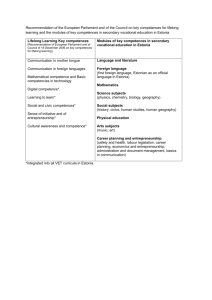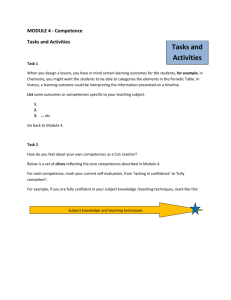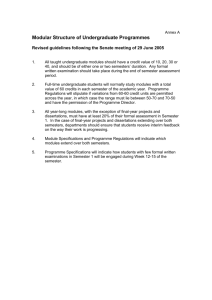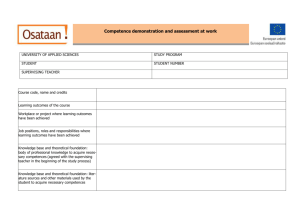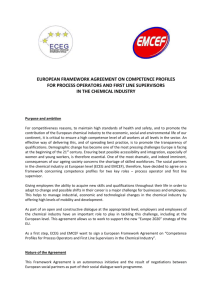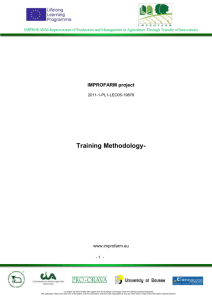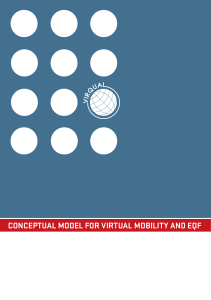Assessmentcriteriaforstudentslearning
advertisement
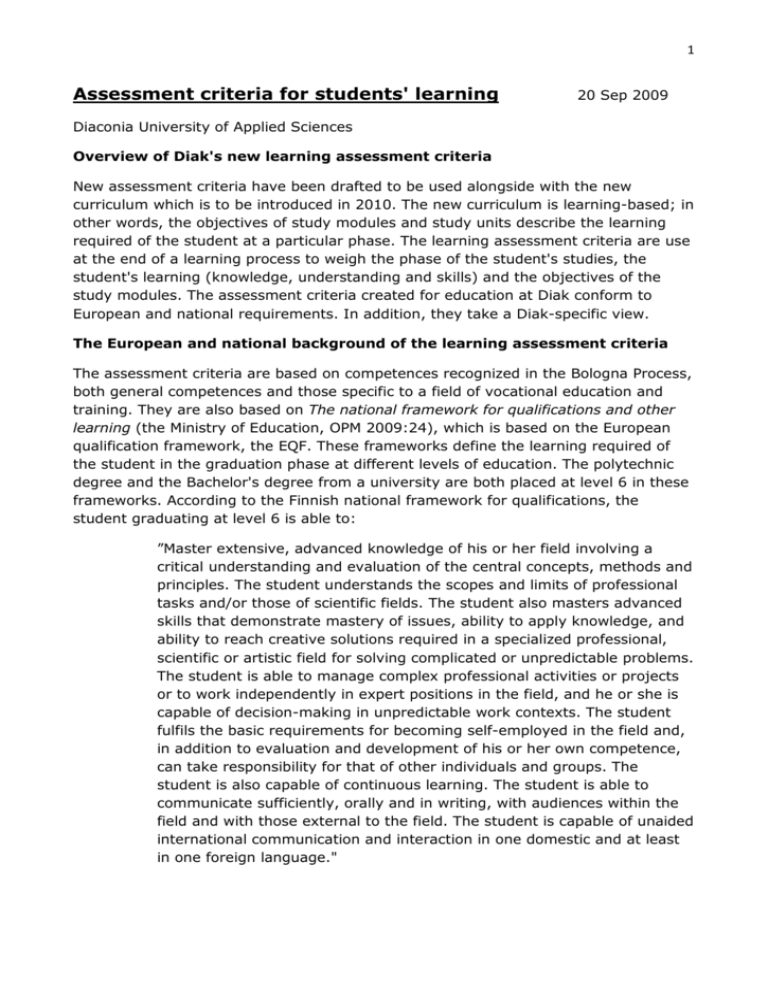
1 Assessment criteria for students' learning 20 Sep 2009 Diaconia University of Applied Sciences Overview of Diak's new learning assessment criteria New assessment criteria have been drafted to be used alongside with the new curriculum which is to be introduced in 2010. The new curriculum is learning-based; in other words, the objectives of study modules and study units describe the learning required of the student at a particular phase. The learning assessment criteria are use at the end of a learning process to weigh the phase of the student's studies, the student's learning (knowledge, understanding and skills) and the objectives of the study modules. The assessment criteria created for education at Diak conform to European and national requirements. In addition, they take a Diak-specific view. The European and national background of the learning assessment criteria The assessment criteria are based on competences recognized in the Bologna Process, both general competences and those specific to a field of vocational education and training. They are also based on The national framework for qualifications and other learning (the Ministry of Education, OPM 2009:24), which is based on the European qualification framework, the EQF. These frameworks define the learning required of the student in the graduation phase at different levels of education. The polytechnic degree and the Bachelor's degree from a university are both placed at level 6 in these frameworks. According to the Finnish national framework for qualifications, the student graduating at level 6 is able to: ”Master extensive, advanced knowledge of his or her field involving a critical understanding and evaluation of the central concepts, methods and principles. The student understands the scopes and limits of professional tasks and/or those of scientific fields. The student also masters advanced skills that demonstrate mastery of issues, ability to apply knowledge, and ability to reach creative solutions required in a specialized professional, scientific or artistic field for solving complicated or unpredictable problems. The student is able to manage complex professional activities or projects or to work independently in expert positions in the field, and he or she is capable of decision-making in unpredictable work contexts. The student fulfils the basic requirements for becoming self-employed in the field and, in addition to evaluation and development of his or her own competence, can take responsibility for that of other individuals and groups. The student is also capable of continuous learning. The student is able to communicate sufficiently, orally and in writing, with audiences within the field and with those external to the field. The student is capable of unaided international communication and interaction in one domestic and at least in one foreign language." 2 In the EQF and in the national framework for qualifications, learning outcomes are defined in terms of knowledge, skills and competences. 'Competence' means the proven ability to use knowledge, skills and personal, social and/or methodological abilities, in work or study situations and in professional and personal development. Competence is described in terms of responsibility and autonomy 'Skills' means the ability to apply knowledge and use know-how to complete tasks and solve problems Skills are described as cognitive (involving the use of logical, intuitive and creative thinking) or practical (involving manual dexterity and the use of methods, materials, tools and instruments). ‘Knowledge’ means the outcome of the assimilation of information through learning. Knowledge is the body of facts, principles, theories and practices that is related to a field of work or study. Knowledge is described as theoretical and/or factual. Use and application of Diak's new assessment criteria Learning assessment is focused on six different areas which are particularly stressed in Diak's study programmes. These include the EQF areas of learning (competence, skills, knowledge): 1) Learning relating to the concepts and phenomena in one's own field and in the related fields (including communications) 2) Learning relating to acquiring information 3) Learning relating to functioning in expert positions and to problemsolving 4) Learning relating to professional interaction (at group work and management levels) 5) Societal and ethical learning 6) Self-management and learning (which are not assessed numerically) Students' assessment criteria are described at a general level. The more precise objectives and outcomes of learning are defined within the study programmes' curricula and implementation plans, against which the assessment criteria are juxtaposed and made concrete. The assessment criteria in the different areas of learning concern three phases: 1) initial phase (semesters 1-3) 2) middle phase (semesters 4-6) 3) final phase (semesters 7-8) Assessment criteria are used for assessing the student's comprehensive learning and vocational learning, in particular. Language studies have their own assessment criteria. Learning outcomes are described as 1 (satisfactory), 3 (good) and 5 (excellent). 3 o In addition to the learning required at level 5, level 5 also includes the learning required at levels 1 and 3. o In addition to the learning required at level 3, level 3 also includes learning at level 1. o The placement of the student's learning outcome at a certain level results from a comprehensive assessment and does not require that all six areas of learning are at the same level at any one time. o Different areas of learning may be stressed in different study modules. The formation of the grade (Note! This is in relation to the emphasis agreed for the criteria in each study module.): o Grade 5, when the learning represents criteria at levels 1, 3 and 5 o Grade 4, when the learning represents criteria at levels 1, 3 and partly 5 o Grade 3, when the learning represents criteria at levels 1 and 3 o Grade 2, when the learning represents criteria at level 1 and partly 3 o Grade 1, when the learning represents criteria at level 1 o No grade/no approval when the learning does not achieve level 1 Grade 1 in final phase studies is the lowest level at which a qualification can be achieved, and all the areas of learning must be achieved at least at level 1. Learning assessment is a tool for both students and teachers, aiming to focus studies toward the mastery of totalities, binding individual study modules and yearly themes together. These assessment criteria will be modified after user feedback.
